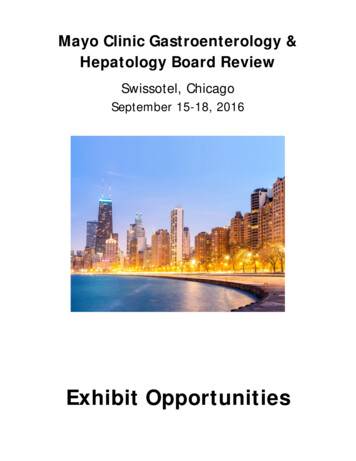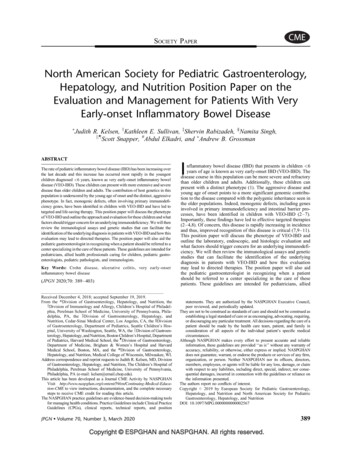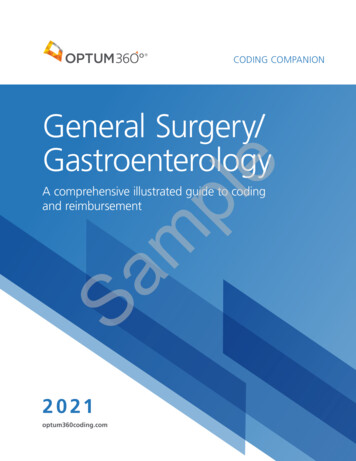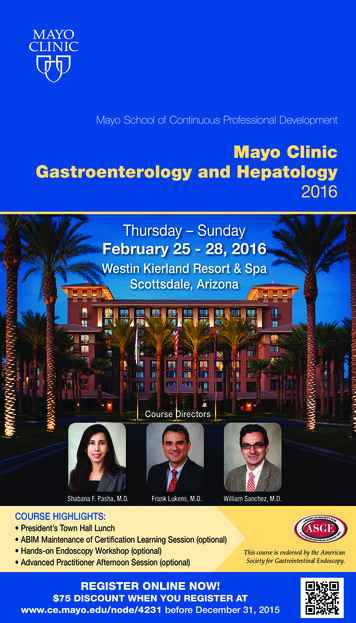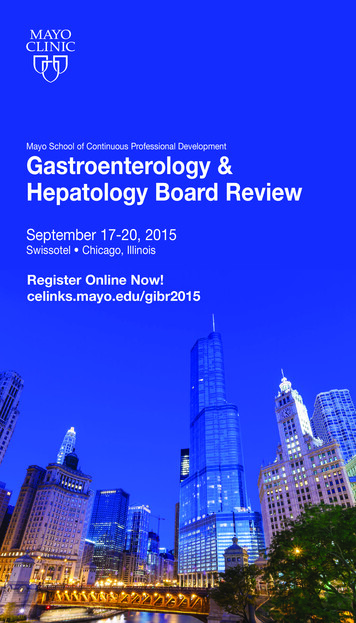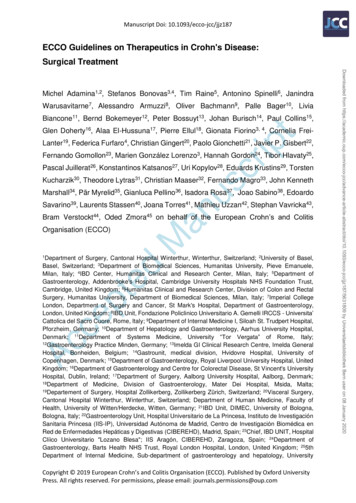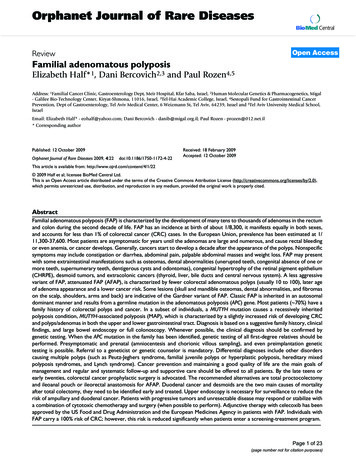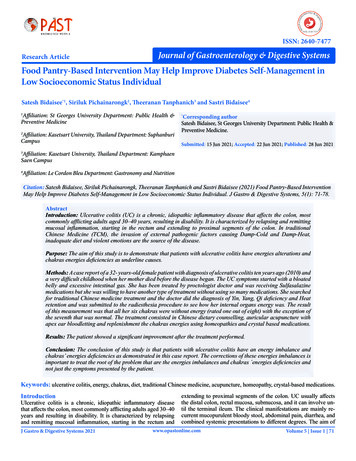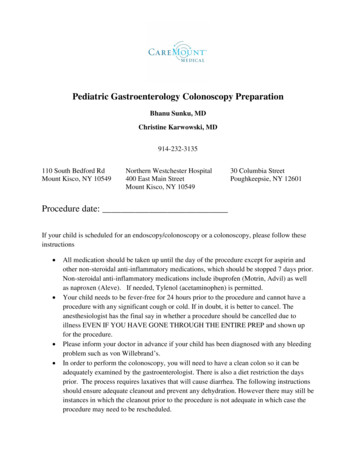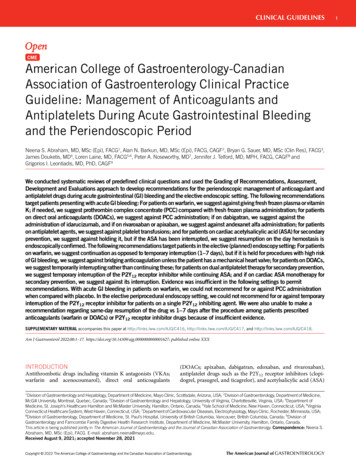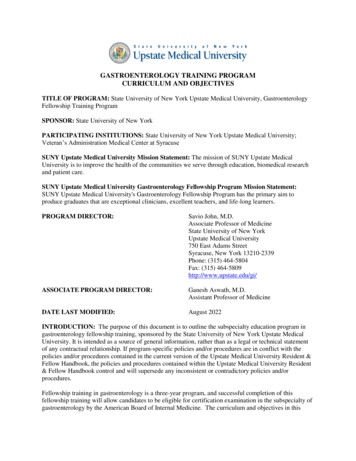
Transcription
GASTROENTEROLOGY TRAINING PROGRAMCURRICULUM AND OBJECTIVESTITLE OF PROGRAM: State University of New York Upstate Medical University, GastroenterologyFellowship Training ProgramSPONSOR: State University of New YorkPARTICIPATING INSTITUTIONS: State University of New York Upstate Medical University;Veteran’s Administration Medical Center at SyracuseSUNY Upstate Medical University Mission Statement: The mission of SUNY Upstate MedicalUniversity is to improve the health of the communities we serve through education, biomedical researchand patient care.SUNY Upstate Medical University Gastroenterology Fellowship Program Mission Statement:SUNY Upstate Medical University's Gastroenterology Fellowship Program has the primary aim toproduce graduates that are exceptional clinicians, excellent teachers, and life-long learners.PROGRAM DIRECTOR:Savio John, M.D.Associate Professor of MedicineState University of New YorkUpstate Medical University750 East Adams StreetSyracuse, New York 13210-2339Phone: (315) 464-5804Fax: (315) 464-5809http://www.upstate.edu/gi/ASSOCIATE PROGRAM DIRECTOR:Ganesh Aswath, M.D.Assistant Professor of MedicineDATE LAST MODIFIED:August 2022INTRODUCTION: The purpose of this document is to outline the subspecialty education program ingastroenterology fellowship training, sponsored by the State University of New York Upstate MedicalUniversity. It is intended as a source of general information, rather than as a legal or technical statementof any contractual relationship. If program-specific policies and/or procedures are in conflict with thepolicies and/or procedures contained in the current version of the Upstate Medical University Resident &Fellow Handbook, the policies and procedures contained within the Upstate Medical University Resident& Fellow Handbook control and will supersede any inconsistent or contradictory policies and/orprocedures.Fellowship training in gastroenterology is a three-year program, and successful completion of thisfellowship training will allow candidates to be eligible for certification examination in the subspecialty ofgastroenterology by the American Board of Internal Medicine. The curriculum and objectives in this
document are outlined in accordance with program requirements for residency education ingastroenterology, published by the Accreditation Council for Graduate Medical Education (ACGME).A candidate is selected for GI fellowship based on a number of factors. These include, but are not limitedto: performance on standardized test; grades and transcripts, letters of recommendation (3); degree ofresearch experience; personal statements; academic interests; ability to speak and understand English;completion of Internal Medicine Residency training and at least “Board Eligible” status; and interviewperformance.Our program has been accredited since 1987. Fifty-two fellows have successfully completed our GIFellowship during this time. To date, all of our GI fellows who have taken the test have been BoardCertified.I. PROGRAM OUTLINE - GENERALA. Training in the gastroenterology fellowship program will provide opportunities for fellows todevelop clinical competence in the field of gastroenterology, including exposure to hepatology, clinicalnutrition, gastrointestinal oncology, radiology, and pathology. While this is a subspecialty program,training will emphasize the trainee functioning as a total academic physician, internist and consultant,with interest in the entire person and his/her environment.B. The training program will be three years in duration and will provide the opportunity for thetrainee to observe and manage patients with a wide variety of digestive disorders in both the outpatientand inpatient setting.C. The training program will provide access to the basic and clinical sciences necessary todevelop the skills necessary to practice sound gastroenterology.D. The training program will be designed to teach critical analysis and reasoning relative toclinical and investigative problems in gastroenterology, and to consider choices in light of currentcost/benefit analysis.E. The training program will be designed to teach both cognitive and technical aspects ofgastrointestinal endoscopy.F. The training program will offer in-depth interaction with other disciplines such as radiology,pathology, surgery, pediatrics and nutrition. Principles of psychosomatic medicine will also be taught.G. While this is primarily a clinical training program, it is recognized that research training ismandatory for all fellows in training and will receive appropriate emphasis.II. TEACHING STAFFAll Faculty receive training in work hour rules, moonlighting and general policy regardingFellows’ service annually. In conjunction with this training a refresher/review of fatigue recognition andmanagement will be conducted during the annual Fellowship orientation meeting. Strategies for assessinglearners for - and helping learners with - fatigue, triage, and stress management will be reviewed attraining session. Teaching Attendings are to attend greater than 50% of all required teaching conferencesand all appropriate 360-degree evaluations.A. The following are the full-time key academic staff of the State University of New YorkUpstate Medical University Gastroenterology Fellowship Training Program:
BOARD CERTIFIEDIMGIHepCCCCCCCCCCCCCCCCCCCCRonald D. Szyjkowski, MDSavio John, MDGanesh Aswath, MDHafiz Muzaffar A. Khan, MDKelita Singh, MDUma Murthy, MDAnand Gupta, MDBishnu Sapkota, MDAjoy Roy, MDIM Internal Medicine, GI Gastroenterology, Hep Hepatology, C Board Certified, E Board EligibleIII. CONSULTANTSScholarly input from outside consultants – the advent of recorded talks, societal programs such asthe ACG universe and didactic material from major scholarly meetings have allowed this function to nowinclude prepared teaching programs. These consultants are of the highest caliber and enjoy a national andoften international reputation and may at time be virtual. When possible, interaction will be structured toprovide a close, intense, small group experience in which clinical problems are discussed in detail andquestions are encouraged to maximize the learning experience.IV. RESOURCESA. General and Patient Population - The participating institutions and facilities for the StateUniversity of New York Upstate Medical University are the Upstate Medical University, UpstateCommunity Hospital, and the Veteran’s Administration Medical Center at Syracuse. All facilities aretertiary care referral centers which provide staff support and material consistent with tertiary care referralhospitals. The general medical patient population is diverse and is derived from the population base livingin and around the immediate Syracuse area. Additionally, Upstate Medical University is the majorreferral center for central New York servicing outlying facilities from the Canadian border toPennsylvania and Veteran’s Administration Medical Center at Syracuse serves as the primary referralhospital for a variety of outlying hospitals and clinics. It is the major source for veteran’s inpatient care incentral New York. Additionally, patients are also referred from local military bases.B. Physical Plant - The Gastroenterology Services at all hospitals have very modern physicalfacilities that provide adequate office space, as well as individual areas for each type of diagnostic andtherapeutic procedures and modalities. All hospitals share the medical school’s library facility whichprovides an excellent selection of current gastroenterology and internal medicine textbooks and journals.C. Inpatient Facilities - The Gastroenterology Service provides consultative services to patientswho are admitted to each facility.D. Endoscopic Facilities and Equipment - The Gastroenterology Services of all hospitals enjoystate-of-the art equipment, which permits safe and skillful performance of the latest diagnostic andtherapeutic endoscopic procedures. The faculty at all institutions possesses the technical expertise andaccess to the equipment to perform the following procedures:HSCVAMC
Upper endoscopyColonoscopyFlexible sigmoidoscopyPercutaneous liver biopsyPercutaneous endoscopic gastrostomyERCP:DiagnosticSphincterotomyBalloon cholangioplasty & pacreatoplastyInsertion of biliary and pancreatic stentsEndoscopic lithotripsyBiliary manometryCholedochoscopyEndoscopic laser therapyEndoscopic therapeutic Hemostasis:LaserBicapHeater probeInjection sclerotherapyVariceal band ligationArgon plasma coagulatorEndoscopic ultrasound - diagnosticEndoscopic ultrasound - therapeuticEsophageal manometryEsophageal pH studiesAnal rectal manometryPhotodynamic TherapyCapsule EndoscopyRadio Frequency YYYYYYYYNNYYAll institutions have state-of-the art fluoroscopy and x-ray equipment available for performing endoscopicprocedures requiring the assistance of fluoroscopy. Endoscopic equipment is also available forperforming endoscopic procedures outside the endoscopy suites, to include those performed in variousintensive care units throughout the hospitals. All facilities have endoscopic equipment which iscompletely computerized and utilizing video endoscopy.V. ROTATIONSA. GENERAL - The fellows in the gastroenterology program will all receive training at allfacilities. Rotations at other facilities, which offer specialty training or expertise not available from eitherinstitution, will be allowed and encouraged based on the fellows’ interest. The three-year fellowship isdivided into 39 four-week blocks or 13 blocks per year. At least 18 months will be devoted entirely toclinical gastroenterology, of which approximately 35% of which will be related to diseases of the liver.The third year of gastroenterology fellowship training will stress research, advance therapeutics to includeERCP and endoscopic ultrasound, and motility training. Training in hepatic transplantation, clinicalnutrition, and pediatric gastroenterology will also be encouraged. The fellows will also be exposed toapproximately 3-6 months of inpatient consultative rotations during the third year of fellowship. Thespecific details of the rotations follow.B. GENERAL OUTPATIENT CLINIC ROTATION (ALL FELLOWS – 8-13 BLOCKSTOTAL) - Examines and treats scheduled and unscheduled patients with a wide variety of common
gastrointestinal conditions. Fellows will also see more acute emergency patients with more complexproblems, requiring interaction with surgical and radiology departments at all facilities. By their natureeach facility will have different patient populations and consultative experiences, allowing the fellow tolearn how to manage inpatients in various settings/practice patterns, which is our goal. Patients arefollowed for their active problems or referred back to the primary physician. When appropriate, longterm follow up will be continued through the fellow’s continuity clinic. Fellows will perform GIendoscopic procedures on such patients after a determination is made that such procedures are required.The second-year fellow will begin to be exposed to motility as well as some advanced diagnostic andtherapeutic procedures during this rotation. When occasionally assigned to this rotation, third year fellowswill focus on assessment of patients requiring more advanced procedures and emphasis will be paced onfollowing those patients into the procedure area.GOALS: The outpatient rotation is designed to allow the trainee to gain expertise in handling a multitudeof common gastrointestinal problems, not only from a scientific standpoint, but also to includepsychosocial considerations. Experience at determining appropriate follow-up intervals and scheduling isalso gained, thus develop clinical competence in the field of gastroenterology. As the fellows progress,emphasis will allow involvement in complicated cases requiring advanced diagnostic and therapeuticmodalities. All fellows will be assessed for the six competencies as outlined on the Internal medicineResident evaluation Form, including patient care, medical knowledge base, practice-based learning,interpersonal and communication skills, professionalism and systems based learning. Overall all clinicalacumen and competence will also be assessed. Ongoing assessment of progress will be included in theevaluation process at all levels.The first-year fellow will be evaluated based on ability to develop a pertinent and coherent differentialdiagnosis based on a history and physical. The fellow’s knowledge of indications and contraindicationsto medicines, therapeutic plans and endoscopy will be assessed for competency and to ensure adequateprogression and maturation.The second and third year fellows will be expected to have mastered the basic ability to develop apertinent and coherent differential diagnosis based on a history and physical and will be evaluated onbeing able to appropriately focus that evaluation on the gastrointestinal tract. The fellow’s knowledge ofindications and contraindications to medicines, therapeutic plans and endoscopy will be assessed forcompetency and to ensure adequate progression and maturation. The fellow should be beginning tomaster integration of data to form a coherent assessment and plan.The third-year fellow assigned to this rotation will have these same expectations and evaluations with anemphasis on complex patients and procedures.C. INPATIENT CONSULTATIONS (ALL FELLOWS – 12-17 BLOCKS TOTAL) –During those rotations the fellows consult on patients with gastrointestinal problems at all sites,depending upon assignment, hospitalized on various inpatient wards including general medicine, surgical,pediatric wards, and various intensive care units throughout all institutions. The fellow evaluates patientsand advises primary care and specialty services physicians of his diagnostic impressions, recommendeddiagnostic tests and appropriate therapy. The trainee also performs endoscopic procedures or other GIprocedures generated by such patient contacts, under the direct supervision of the attending staff.GOALS: To evaluate patients who are generally sicker than those seen in the outpatient setting at anacademic center, a mixed academic and closed population center and a community practice dependingupon assignment. Complex co-morbid inpatient problems are seen at both the Upstate sites and VAMedical Center. This mix aids in the development of factual knowledge, reasoning ability and problem
solving. In addition, the trainee learns the art of consultative medicine in different clinical settings, whichrequires interaction with the primary and specialty physicians to influence the final diagnostic andtherapeutic decisions. This activity develops experience with differing levels of “like it” assertivenessand diplomacy. All fellows will be assessed for the six competencies as outlined on the Internal medicineResident evaluation Form, including patient care, medical knowledge base, practice-based learning,interpersonal and communication skills, professionalism and systems-based learning. Overall all clinicalacumen and competence will also be assessed. Ongoing assessment of progress will be included in theevaluation process at all levels and at each site.The first-year fellow will be evaluated based on ability to develop a pertinent and coherent differentialdiagnosis based on a history and physical. The fellow will also be evaluated on their ability to adequatelytriaging of consults. Instruction and assessment will be geared toward allowing the fellow to developtheir knowledge base and clinical experience to that end, and therefore the greater percentage of thisexperience will be at University Hospital and the VA Medical Center. The fellow’s knowledge ofindications and contraindications to medicines, therapeutic plans and endoscopy will be assessed forcompetency and to ensure adequate progression and maturation.The second-year fellow will be expected to have mastered the basic ability to develop a pertinent andcoherent differential diagnosis based on a history and physical and will be evaluated on being able toappropriately focus that evaluation on the gastrointestinal tract. The fellow will be assessed for theirability to appropriately triage consults and will be expected to be significantly more proficient than duringthe first year. The fellow’s knowledge of indications and contraindications to medicines, therapeuticplans and endoscopy will be assessed for competency and to ensure adequate progression and maturation.The fellow should be beginning to master integration of data to form a coherent assessment and plan andwill be expected to be beginning to transition toward independent inpatient consultation.The third-year fellow will be expected to not only have mastered the basic ability to develop a pertinentand coherent differential diagnosis based on a history and physical but also to be able to appropriatelyfocus that evaluation on the gastrointestinal tract. The fellow should be able to consistently makeappropriate triage decisions. The fellow should be virtually competent in their knowledge of indicationsand contraindications to medicines, therapeutic plans and endoscopy will be expected to continue toprogress toward being able to practice independently and therefore they will be afforded the opportunityto have the bulk of activity at the Upstate sites. The inpatient staff will specifically assess the fellow’sability to integrate of data to form a coherent assessment and plan. This plan should include appropriateuse of ancillary services and assessment of the most medically appropriate venue (i.e. outpatient versusinpatient.) The fellow will be specifically assessed for the ability to transition to independent inpatientconsultation.D. ADVANCED OUTPATIENT CLINIC ROTATION (3RD YEAR FELLOW – 3-6BLOCKS TOTAL) – As with the general outpatient clinic rotation (above) the fellow examines andtreats scheduled and unscheduled patients with a wide variety of unusual gastrointestinal conditions. Thefellow is exposed to a truly outpatient experience with emphasis on the outpatient experience in a moreprivate practice like arena. The fellows are also supervised while seeing more acute emergency patientswith their attending and triaging and determining acuity and level of care needs. They will see patientswith attendings caring for more complex problems, requiring therapeutic intervention, such as withERCP, in order to experience the unique outpatient aspects of those types of patients. The fellow will beallowed to assess patients sent for and to perform the majority of motility and pH studies in conjunctionwith the attending staff. Patients are followed for their active problems or referred back to the primaryphysician or gastroenterologist. When appropriate, long term follow up will be continued through thefellow’s continuity clinic and the fellow in this role will be the on-site provider for the group of patients
managed in fellows’ clinic. The fellow’s clinic schedule will be structured so that they can participate indidactic discussions about these cases and so that they can perform or assist in performing all therapeuticand advanced diagnostic at all facilities, having their procedures at the outpatient center. The fellows willbe supervised in triage and management of outpatient issues, assess immediate and remote care issues andlearn methods of interacting with clinical and administrative staff ion the outpatient arena.GOALS: To allow an on-site, focused, and truly didactic outpatient setting in which the fellow can beexposed to and learn from complicated cases requiring advanced diagnostic and therapeutic modalities.To give the fellow greater responsibility in determining the best overall care plan for the patients they areconsulted on as well as to learn how to function in this manner in a true outpatient setting, which is mostlikely to reflect their ultimate practice. It is not the goal of this rotation to ensure sufficient skill isdeveloped to recommend independent practice in these advanced procedures after graduation, but it is thegoal of this rotation to arm the fellows with the knowledge, skills and attributes to successfully functionindependently in various outpatient clinical settings.The third-year fellow will be expected to not only have mastered the basic ability to develop a pertinentand coherent differential diagnosis based on a history and physical but also to be able to appropriatelyfocus that evaluation on the gastrointestinal tract. The fellow should be virtually competent in theirknowledge of indications and contraindications to medicines, therapeutic plans and endoscopy will beexpected to continue to progress toward being able to practice independently. The fellow should be ableto integrate of data to form a coherent assessment and plan. The fellow will be specifically assessed forthe ability to transition to independent practice. At the same time the fellow will be assessed for the sixcompetencies as outlined on the Internal medicine Resident evaluation Form, including patient care,medical knowledge base, practice-based learning, interpersonal and communication skills,professionalism and systems-based learning.E.RESEARCH AND SCHOLARLY ACTIVITIES (2 BLOCKS PER YEAR)Fellows will be exposed to research activities by designing a clinical or basic science research protocol,which would then be submitted for approval by the Institutional Review Board and Human UseCommittee of the respective institutions, either Upstate or the Syracuse VA. Once the protocols havebeen approved, fellows will then conduct the study under the supervision of a staff gastroenterologist, incooperation with other members of facilities where appropriate. Fellows will be taught how to analyzedata and apply statistical techniques to interpret such data. A manuscript will then be prepared, which willbe submitted to satisfy fellowship program graduation requirements. Preparation of a publishable pieceof investigation, either clinical or basic science, is required for graduation. At the end of each Researchrotation, the fellows will be required to submit a Research form to the fellowship coordinator, signed bytheir mentor, outlining what they’ve worked on.Mentor/Fellow Meeting Schedule:2 months BEFORE Scheduled Rotation: Fellows are REQUIRED to meet with their mentor at least 2months before their Research block is scheduled to begin to come up with a proposal. Failure to do sowill result in that block will be changed to Outpatient.1st Day of Scheduled Research Block: Fellow must meet with their mentor on the first day of theirResearch block to go over their plan for the block, how they will spend their time, what they plan toaccomplish, etc.By End of Research Block: Fellows must submit a report to their mentor and the fellowship coordinatorno later than the final day of their scheduled research block. Failure to do so will result in their nextResearch block being changed to Outpatient.GOALS: To acquaint the trainee with the scientific method by asking and attempting to answer a
question of biomedical important. It is expected that the research performed will eventually lead to ascientific presentation at a national meeting and a published manuscript.First year fellows will be expected to develop a hypothesis and complete a research proposal and have itevaluated and approved by the appropriate reviewing board. This will be in conjunction with a staff ofthe fellow’s choice who agrees to support the project.The second year will be expected to complete virtually all of their data collection in conjunction withtheir staff and in preparation for manuscript preparation, presentation, etc.The third-year fellow will be expected to prepare a manuscript in publishable format in conjunction withtheir staff. This will be reviewed by the collective teaching faculty for adequacy and will be reviewedduring a monthly research meeting or journal club.For the most up to date documents for both UH and VA Research requirements, you can contactthe program coordinator, or access them via our Google K0DtQGqI5lkOgQsECkBHp8uUQHvs?usp sharingUpstate IRB Approval Process:For Upstate Research, you’ll need to complete the following CITI Training at ww.citiprogram.org Choose State University of New York (SUNY) for the institution, here:https://www.citiprogram.org/index.cfm?pageID 154&icat 0&ac 0®ion 1&message 0 Create your user name and password. Complete Steps 1-7 as it directs you to fill out all necessary information (contact, etc.). This should be no cost to you if you register under Upstate. Complete the following modules:o Human Subjects Research – Group 1o Responsible Conduct of Researcho Conflict of Interesto Good Clinical Practice, if not previously completed Register with IRBNet at https://www.irbnet.org/release/index.html Click: New User Registration (upper right-hand corner) Enter your legal first and last names in the appropriate fields. (Please use appropriate capitalization as youregister into the system; the system does not alphabetize names that begin with lower-case letters.) Create your User Name and Password (at least 8 characters); confirm your password, and enter a passwordhint. Click on Continue Accept the Terms of Use On the next screen, type “Upstate” in the “Search for an organization” field and click “Search” OR scroll toand select “SUNY Upstate Medical University” from the list on the screen. Review info for accuracy, edit if needed, then Click on Continue On the next screen, enter your telephone number and email address; click on Continue Click Register; Click Continue You will receive an email from IRBNet with a link that you need to click on in your e-mail in order toactivate your account.
VA IRB Approval Process:Anyone doing research with a VA faculty will need to work on this before and while they are on their VA researchmonths. Contact VA HR to obtain a Research WOC Appointment, which will allow you to do Research at theSyracuse VA. This is handled solely by HR and can take a couple of months to complete. You will needthis appointment before you are able to submit anything. For anyone doing Research, the VA requires CITI training. You may be able to knock this out for UH andthe VA at the same time, since UH requires the same training for UH IRB approval (reminder/details ofthat attached). Heather Hall from the VA (HR/IRB Administrator) provided us with the attached research determinationguide for you to look at. Once you get to this point, you’ll need to email Heather your proposed protocolfor the study and/or quick overview (heather.hall3@va.gov).Approval of these studies would be limited to the Syracuse VA exclusively. There are ways of including otherVAMC’s in a study but that is another process in itself, she says.Once a study is submitted to the VA IRB, it general takes about one month for review before going to the R & DCommittee for their approval. If the IRB has questions or concerns, this can go back and forth several timeslengthening the process. If it is a simple study that the IRB has no issues with, it can be approximately 2 months forapproval. If there is a lot involved and the IRB has requests for changes, it can take several months.
VA Research Determination Aid Sheet:
F. Pregnancy in Gastrointestinal disordersThis monograph is available in our curriculum library both in print form (which will be stored in thefellow's library at the CWB) and virtually. (To view virtually, please request from program administratormasullon@upstate.edu )The structure of our educational system is such that fellows have less than average exposure to pregnantpatients, therefore reading of this document will be required. Each fellow will sign an attestation formdocumenting this once during their fellowship.As a part of their duties regarding conference scheduling, the third-year fellow will insure that at least oneTuesday lecture each quarter will be devoted to topics in this document.G. Monograph on IBS, Constipation and Acid-Related DisordersThis monograph is available in our curriculum library virtually.Reading of this document will be required. Each fellow will sign an attestation form, documenting this,once during their fellowship.H. Module on ucationmodule/homeEach fellow will sign an attestation form documenting this once during their fellowship.I. To report patient safety events, click on link – occurrence J. Sexual violenceCopy of “Workplace Sexual Violence” flyer below.Each fellow will sign an attestation form documenting this once during their fellowship. Eachattending, NP, PA will sign an attestation form documenting the review of this flyer at beginningof their employment.
K. IHI Quality/Safety Modules-Basic Certificate Requirement – to be completed by AllFellows in their First Year.Please reference the attached instruction page for accessing education module.MilestonesFirst Year:a. Esophagogastroduodenoscopy - Minimum of 25 supervised studiesb. Esophageal dilations - Minimum 5 supervised studiesc. Colonoscopy with polypectomy - Minimum of 25 supervisedcolonoscopiesand 5 supervised polypectomiesd. Percutaneous endoscopic gastrostomy - Minimum of 3 supervisedstudies and completion of didactic training in complications and anatomyand physiology of replacement relative to time of placementa. Biopsy of the mucosa of the esophagus, stomach, small bowel and colon- Minimum 5 supervised studies any siteb. Moderate sedation – Completion to competencec. Summary of evaluations showing adequate performance in each of thesix core competenciesSecond Year:a. Esophagogastroduodenoscopy - Minimum of 50 supervised studiesb. Esophageal dilations - Minimum 10 supervised studiesc. Colonoscopy with polypectomy - Minimum of 50 s
completion of Internal Medicine Residency training and at least "Board Eligible" status; and interview performance. Our program has been accredited since 1987. Fifty-two fellows have successfully completed our GI Fellowship during this time. To date, all of our GI fellows who have taken the test have been Board Certified.
